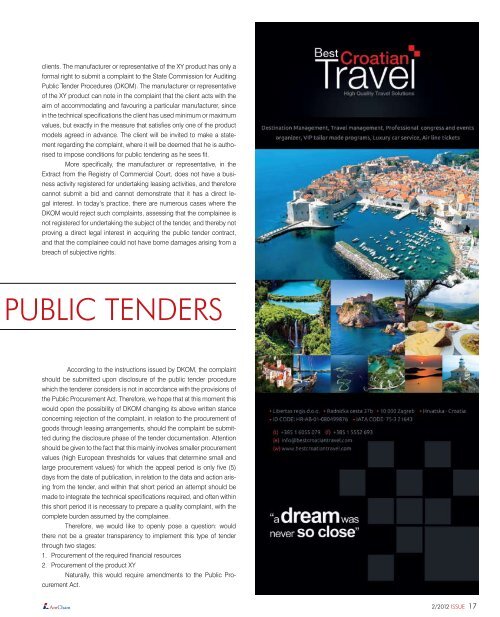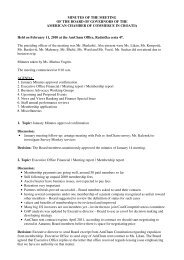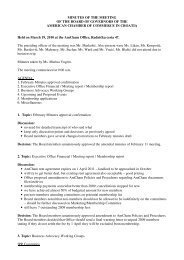News&ViewsThe total value of concluded contracts resulting frompublic tender procedures is exceptionally important in difficult marketcircumstances:• total value of public tenders in 2009 amounted to HRK 40 billion(11.89 % less than in 2008)• total value of public tenders in 2010 amounted to HRK 24 billion(38.9% less than in 2009)• according to recently available data from the Preliminary StatisticalReport on Public Tenders for the Republic of Croatia, for the periodJanuary – September in 2011, the amount was HRK 18 billion.››› The structure of contract values based on public tendersUndoubtedly, the prevailing criteria for assessing a bid in publictenders is currently the same as it was in earlier years, which is the lowestprice, in combination with the detailed specifications of products orservices that are procured. This leads to a race for pricing leadership, withconsequences leading to unforeseeable damage (impermissible divisionof the market amongst the competition to the detriment of the client).By the client applying the lowest price criteria, the life timeduration of the object of procurement, maintenance costs, and postsalesservice (servicing and spare parts) are completely unjustifiablyneglected. The total value that is acquired for the money is not takeninto consideration. Ease and benefits of usage, and the supplier’s competenceand references are neglected, including the product’s capacityand functionality, user safety, and environmental aspects.The question is posed as to how to direct clients to apply theBVS – the best value selection, since the practice in the EU is clearlydefined: Directive 2004/18/EC for the evaluation of offers based on theprinciple of BVS recommends a model based on the sum of weightedpoints that are assigned according to all criteria, and since January2006, EU legislation requires that weight criteria also be included in thetender documentation.reportIN SEARCH OF A WAY TO IMPROVEBy Teknoxgroup Hrvatska d.o.o.The ratio of selection criteria according to the number of tendercalls and values of concluded contracts:SelectionNumber % Value %criteriaPublic Sector Public SectorBVS 0.54 0.12 0.77 0.15Lowest price 81.41 17.93 69.86 29.22TOTAL 81.95 18.05 70.63 29.37OVERALLTOTAL100.00 100.00Source of information for the graphical and tabular illustration: Ministry of Economics,Labour and EntrepreneurshipPreliminary Statistical Report on Public Tenders in the Republic of Croatia for theperiod January – September 2011.BVS (Best Value Selection) Criteria – Best value for money accountsfor only 1%:• in the total number of bids• in the total value of concluded agreements.Quotes and the thoughts of JOHN RUSKIN (1819-1900):• It is unwise to pay too much, but it is worse to pay too little.• When you pay too much, you lose a little money...that is all.• When you pay too little you sometimes lose everything, because thething you bought was incapable of doing the things it was boughtto do. The common law of business balance prohibits paying a littleand getting a lot...it cannot be done.There are also other public tender procedures that are disputable.Often, in public tenders we come across the Call for Tendering forthe “procurement of product XY through financial leasing”If you wonder who will be the tenderer, the answer is the leasingcompany. Perhaps you thought that it would be possible for the tendererto be a manufacturer or representative of a foreign manufacturer of theparticular XY product that is being sought?However, according to the Public Tender Act (the old andamended version), the subject of <strong>this</strong> type of tender is a financial service,and also the question of legal interest is posed.The manufacturer or representative of the respective product issurely not a company registered for conducting leasing services (even ifit were licensed by the Croatian Financial Services Supervisory Agency(HANFA), it continues to be subject to inspection for jobs that it doesnot intend to undertake in any way). Therefore, the manufacturer or representativecannot submit a bid for <strong>this</strong> type of tender.The tenderer who is a manufacturer of the product may seekan amendment to the product’s technical specifications. The client mayrefuse such a request since he has the authority to impose conditionsfor the tender as he sees fit. The manufacturer or representative of theproduct is only left with the possibility of submitting a complaint sincesurely no company that is registered for conducting leasing operationswill do so since it is not in its interests to weaken relations with any of its16 ISSUE 2/2012
clients. The manufacturer or representative of the XY product has only aformal right to submit a complaint to the State Commission for AuditingPublic Tender Procedures (DKOM). The manufacturer or representativeof the XY product can note in the complaint that the client acts with theaim of accommodating and favouring a particular manufacturer, sincein the technical specifications the client has used minimum or maximumvalues, but exactly in the measure that satisfies only one of the productmodels agreed in advance. The client will be invited to make a statementregarding the complaint, where it will be deemed that he is authorisedto impose conditions for public tendering as he sees fit.More specifically, the manufacturer or representative, in theExtract from the Registry of Commercial Court, does not have a businessactivity registered for undertaking leasing activities, and thereforecannot submit a bid and cannot demonstrate that it has a direct legalinterest. In today’s practice, there are numerous cases where theDKOM would reject such complaints, assessing that the complainee isnot registered for undertaking the subject of the tender, and thereby notproving a direct legal interest in acquiring the public tender contract,and that the complainee could not have borne damages arising from abreach of subjective rights.PUBLIC TENDERSAccording to the instructions <strong>issue</strong>d by DKOM, the complaintshould be submitted upon disclosure of the public tender procedurewhich the tenderer considers is not in accordance with the provisions ofthe Public Procurement Act. Therefore, we hope that at <strong>this</strong> moment <strong>this</strong>would open the possibility of DKOM changing its above written stanceconcerning rejection of the complaint, in relation to the procurement ofgoods through leasing arrangements, should the complaint be submittedduring the disclosure phase of the tender documentation. Attentionshould be given to the fact that <strong>this</strong> mainly involves smaller procurementvalues (high European thresholds for values that determine small andlarge procurement values) for which the appeal period is only five (5)days from the date of publication, in relation to the data and action arisingfrom the tender, and within that short period an attempt should bemade to integrate the technical specifications required, and often within<strong>this</strong> short period it is necessary to prepare a quality complaint, with thecomplete burden assumed by the complainee.Therefore, we would like to openly pose a question: wouldthere not be a greater transparency to implement <strong>this</strong> type of tenderthrough two stages:1. Procurement of the required financial resources2. Procurement of the product XYNaturally, <strong>this</strong> would require amendments to the Public ProcurementAct.2/2012 ISSUE 17













